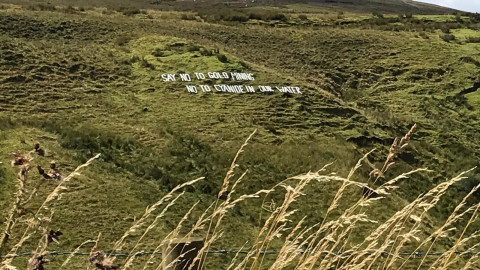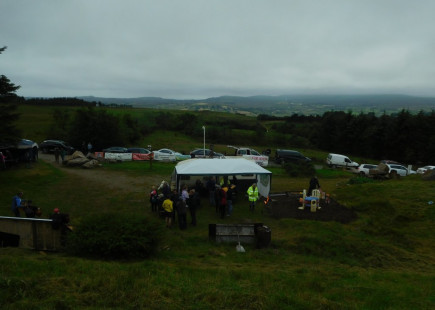Save Our Sperrins: Water, more precious than gold
Regions
The hills of the Sperrins in County Tyrone are criss-crossed with natural springs that flow off the western slopes towards the River Foyle, while to the east they meander down to Lough Neagh. This endless trickle of water recalls the natural order – water belongs here. But the people of this remote area are struggling to protect it from an impending and devastating gold rush.

Gold deposits
In the 1980s, geochemical surveys confirmed substantial gold deposits in the hills of county Tyrone. Mining companies were however reluctant to exploit the undeveloped gold seam because of the volatile political situation and ongoing armed conflict.
Fast forward 30 years and Canadian mining company, Dalradian Gold, has submitted a 10,000 page planning application to develop an underground mine, estimated to be the seventh largest in the world.
A cocktail of cyanide, mercury, toxic waste and sinkholes
The technical jargon and the enormity of the proposal in the planning application makes for arduous reading. The mine initially envisaged the construction of a cyanide processing plant, a mercury smelting furnace, a toxic waste storage dump, contaminated water storage ponds, a waste water treatment plant and an explosives store, all in a designated area of outstanding natural beauty and within one kilometre of Greencastle primary school and sports grounds.
On 13 August 2019, Dalradian announced that it no longer plans to use cyanide, that the ore would instead be exported for treatment elsewhere, but did not mention where. The possibility remains that the cyanide processing will simply be displaced to some other corner of the globe and some other community will be left with the consequences. Similarly, the company could not confirm if mercury would be used – a significant detail considering the dangers associated with metal poisoning.
Cyanide or not, other problems remain. In a village in county Monaghan at least three sinkholes have opened recently as a result of mining activity leading to the evacuation of homes and the local school, road closure rendering local businesses inaccessible, and the GAA grounds were permanently destroyed by a large crevice that extends across the entire sports pitch.

Niamh Ní Bhriain and Lorraine Ní Bhriain
Dalradian maintains that the impact will be minimal. The entrance will be shaded by trees, the building infrastructure will be similar to local farm sheds, and grass will be sown on top of the dump creating a nice new green hill for the Sperrins – albeit a toxic one – so, nothing to worry about it would seem. [The author contacted Dalradian for further information and its Public Relations representatives had no information about whether mercury would be used or not but were clear that the visual impact would be minimal.]
Pacification and resistance
Save our Sperrins (SOS) organised to peacefully resist against the advancing gold rush. To date 18,500 objection letters have been submitted to Derry’s Strategic Planning Division. But organising to protect the environment has come at a price. Some protesters have been subjected to acts of intimidation, smear campaigns, verbal abuse, physical violence, and death threats.
The role of the Police Service of Northern Ireland (PSNI) has raised serious concerns that it is dedicated to protecting the company rather than “keeping people safe”, as its slogan suggests.
Protestors described intimidation, surveillance and interrogation by police officers. Rumours suggesting the protestors are dangerous dissident republicans who may be hiding firearms in their protest camp may have been initiated by the police, according to protestors, who prefer not to be named. In one particular case, the police allegedly tried to bribe a protester to become an informer to alert them of any “trouble”.
The author conducted interviews with a number of protesters in July 2019 but will refrain from naming them here for their own safety. Statements to support these testimonies appear on the Greencastle People’s Office and the Save our Sperrins Facebook pages. The author repeatedly contacted the PSNI for a statement regarding their policing of the mining situation but did not receive a response.
In 2016 the PSNI invoiced Dalradian Gold for approximately £400,000 for their role in escorting explosives related to mining operations. The lines between public policing and private security become dangerously blurred when a state police force can invoice a private company for services provided.
Who then are the police actually serving – the corporation or the people?
What emerges is a pattern of police intimidation, harassment, surveillance, and the blurring of the lines between public policing and private security that exemplifies a global model of policing extractivisim through the pacification of resistance. Pacification, which is often misrepresented as security, encompasses an attempt to police the contours of discontent by shutting down progressive spaces that endeavour to challenge corporate power through legitimate, peaceful resistance.
What next?
With no sitting government in Northern Ireland, Brexit looming large, and the value of gold on the rise as fears grow of another global recession, no one knows exactly what will happen next.
One thing is clear though: the spirit of resistance is palpable in the hills of Tyrone, where the water runs clear and is worth more than gold to the people. They are prepared to protect it.
Follow the Save Our Sperrins Facebook page here.
